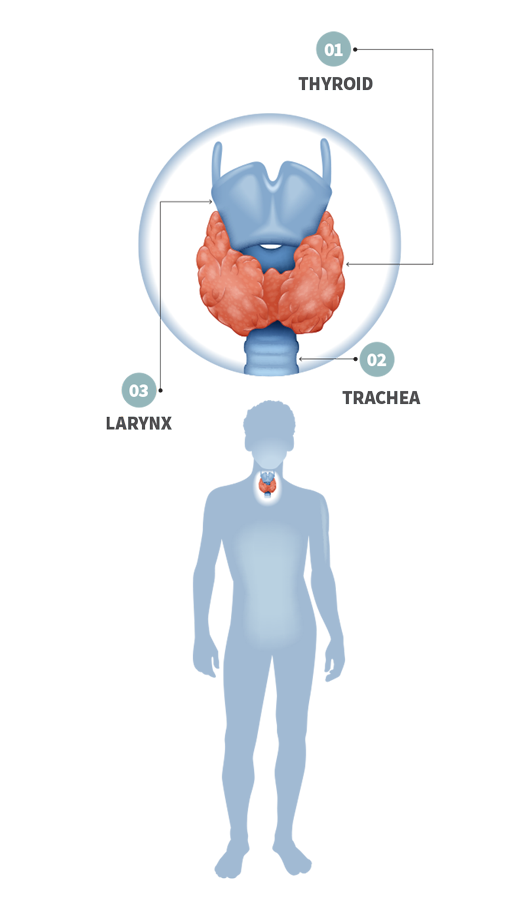GOITER
This is a condition in which the thyroid enlarges and may cause the patient problems with local neck discomfort, and problems with speaking, breathing or swallowing if the gland becomes large enough. Depending on the cause of the goiter, treatment options include medications, radioactive iodine or surgery. A combination of different treatment types may also be employed, depending on the patient’s specific situation.
THYROID NODULES
A thyroid nodule is a small growth of cells inside the thyroid that have lost their normal control mechanisms, thus resulting in a tumor. Such tumors are usually benign but may be malignant (i.e. thyroid cancer, see below). One way to distinguish between benign and malignant nodules is by examining a sample of the tissue under a microscope. This can be achieved by either a needle biopsy (fine needle aspiration or FNA) or excision of either part of or the entire thyroid gland (i.e. thyroidectomy). Tests such as a thyroid ultrasound and radioiodine uptake and scanning can contribute useful information to determine the risk of thyroid cancer for an individual nodule. Depending on the results of testing, nodules may be followed conservatively over time, without intervention, or removed surgically.
HYPERTHYROIDISM
Occasionally, either all or part of the thyroid becomes overactive and produces too much thyroid hormone. In this event, symptoms can include anxiety, fatigue, heat intolerance, tremors, heart palpitations, fast heart rate (tachycardia), shortness of breath, diarrhea, hair loss and weight loss. Patients may or may not have an enlargement of the thyroid (i.e. goiter) and/or protrusion of the eyes (i.e. exophthalmos or proptosis). Treatments can include medications, radioiodine and surgery or a combination of these methods.
HYPOTHYROIDISM
This is a relatively common condition which affects women more often than men and is typically due to autoimmune destruction of the thyroid gland, radiation damage due to inadvertent exposure or a prior surgical procedure in the neck. The most common cause is an autoimmune destruction of the cells of the thyroid gland, also called Hashimoto’s thyroiditis. Patients may experience waxing and waning thyroid function through inflammation and healing that ultimately results in permanent loss of thyroid hormone production. Typical symptoms of hypothyroidism include abnormal fatigue, weight gain, cold intolerance, constipation and dry skin. Standard treatment involves replacement of thyroid hormone with a daily levothyroxine supplement.
THYROID CANCER
Approximately 5% of thyroid nodules contain thyroid cancer which can spread to distant organs, most commonly the lungs, central nervous system and bones. There are several different types of thyroid cancer, many of which have a good prognosis if identified and treated early. Testing for disease spread or recurrence involves measuring a protein called thyroglobulin (Tg), which is made by thyroid tissue. Testing may also involve radioiodine, computed tomography (CT) and positron emission tomography (PET) scanning. Treatments can include surgery, radioiodine, external beam radiation and chemotherapy. Depending on the specific situation, one or more of these methods may be needed. Once successfully treated, thyroid cancer patients must be followed carefully for recurrence and treated early and quickly if recurrence is identified. If thyroid cancer has spread (i.e. metastasized) to distant sites outside of the thyroid, additional treatment types may be needed.
For more information, please visit the American Thyroid Association website.

